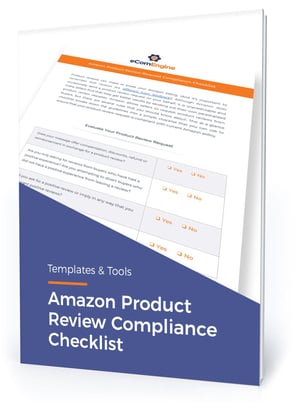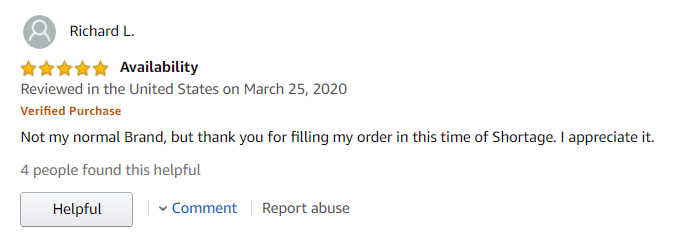Originally published on April 20, 2020, updated August 23, 2023
Menu
Join Our Email List
- Receive our monthly newsletter.
- Stay up to date on Amazon policies.
- Get tips to grow your business.
Customers trust online reviews more than what the seller has to say. In fact, 84% of shoppers trust online reviews as much as personal recommendations from friends. Not only that, but 64% are ready to make a purchase decision after reading between one and six reviews. You can’t buy the kind of advertising you get from Amazon customer reviews!
Naturally, clever sellers want to leverage the value of a good review to the fullest, and proactively seek as many as possible. Most of the time, that’s fine…except when it isn’t. There are a few caveats and restrictions related to Amazon reviews that many sellers aren’t aware of until it’s too late.
Here are answers to three of the most frequently asked questions about Amazon reviews. If you thought up a creative way to use your Amazon review, double-check here to see if it’s possible.
From a legal perspective, the writer of the review owns the copyright to it. You cannot copy and paste it elsewhere any more than you could post a chapter from Harry Potter on your blog. Unless, of course, you get permission.
If you want to use someone’s review for promotional material, all you have to do is ask. If they say “no,” then there’s nothing you can do, but that’s unlikely if you take the right approach.
A positive Amazon review is essentially a testimonial. As mentioned above, peer reviews are perceived as much more sincere than what the seller or spokespeople have to say, making testimonials a powerful marketing agent.
If someone posted a particularly positive, particularly eloquent review on your Amazon product page, you could use that for your own website, product packaging, press releases, email newsletters, social media — anywhere! But in order to use them, you need written permission from the author. Unfortunately, this is challenging due to Amazon's communication guidelines and the rollback of review commenting where you could ask for permission. If you're interested in using Amazon reviews on your website, your best option is to simply add a link from your website to your Amazon product page so shoppers can read the reviews for themselves.
Related reading: How User-Generated Content Marketing Can Transform Your Brand's Reach
 Because Amazon reviews are so influential, it’s tempting to stack the deck a little. Maybe give yourself a glowing review, or enlist a group of friends to review it for you. Those schemes, even when well-intentioned, can violate Amazon’s policies, so here's a quick refresher about what you can and can’t do.
Because Amazon reviews are so influential, it’s tempting to stack the deck a little. Maybe give yourself a glowing review, or enlist a group of friends to review it for you. Those schemes, even when well-intentioned, can violate Amazon’s policies, so here's a quick refresher about what you can and can’t do.
For starters, people connected to either the product or the seller can not post reviews. This includes not only the seller, investors, and manufacturers, but also people who have a “close, personal relationship” with the seller. So you can’t just tell all your friends and family to leave good reviews, because they’ll probably be taken down. Worse, Amazon might view your actions as review manipulation, which it takes very seriously.
Never pay for reviews. This includes offering gift cards or free products to buyers in exchange for a review. You may be willing to pay good money for a positive review — after all, it seems like an appropriate way to spend your advertising budget — but Amazon does not allow it.
Similarly, you can not trade for or exchange good reviews. For example, you and another seller cannot agree to give each other positive reviews. Amazon’s review policies are in place to keep the system as objective as possible. Many of the policies also protect third-party sellers. For example, multiple negative reviews from the same reviewer are prohibited, as are reviews from rival sellers.
The Amazon review system allows reviews to be provided even if the item was not purchased directly from Amazon. For example, people who received the item as a gift or purchased it elsewhere can leave a review.
You may have noticed the “Verified Purchase” tag next to some reviews. This tag shows that the reviewer bought that product from an Amazon seller. If a review doesn’t have that tag, it means they bought the product from a different site or retail store. In some cases, they may not have purchased the item at all. If someone abuses the review system to post fraudulent reviews, you can always report them.

So the answer to the question is yes. Anyone can review any product, no matter where they bought it. Of course, their reviews are still subject to the Amazon community guidelines, including having spent at least $50 on Amazon in the last 12 months. There are also plenty of rules about content, as well as the restrictions we mentioned above.
It’s worth mentioning, though, that Amazon always lists “Verified Purchase” reviews above others, giving them more priority. For products with hundreds of reviews, it’s likely that most customers won’t get around to the unofficial ones.
What about getting more reviews by selling quality products that genuinely excite people? Even if you sell the best products, that doesn’t guarantee good reviews — often people never think twice about returning to Amazon for a review after the delivery, even if they love the item.
Because reviews are so crucial to Amazon's success, it pays to have a little extra help in requesting and managing reviews. FeedbackFive offers an array of review-related services, including:
Try it for free to see how easy it is to request reviews!
Do you still have questions about Amazon reviews? Check out our top review questions and answers or these Amazon seller FAQs.
Originally published on April 20, 2020, updated August 23, 2023
This post is accurate as of the date of publication. Some features and information may have changed due to product updates or Amazon policy changes.
These Stories on Feedback and Reviews
14321 Winter Breeze Drive
Suite 121 Midlothian, VA 23113
Call us: 800-757-6840





Copyright© 2007-2025 eComEngine, LLC. All Rights Reserved. eComEngine®, FeedbackFive®, RestockPro®, and SellerPulse® are trademarks or registered trademarks of eComEngine, LLC. Amazon's trademark is used under license from Amazon.com, Inc. or its affiliates.
No Comments Yet
Let us know what you think